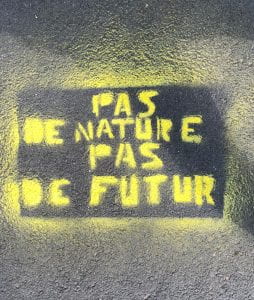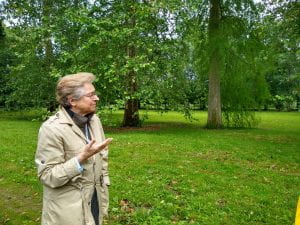France is internationally known for many delicious indulgences, one being their superior wines. Wine enthusiasts from all over the world import this fermented drink because of the unique flavor profiles that several regions in France offer. Each region has a specific climate and soil composition that influences the taste and freshness of the grapes used to make wine. However, many of the techniques used to grow wine pose potential threats to the environment and the health of individuals working on vineyards.
Grape vines are generally relatively easy to grow. That is, if you don’t take into account their vulnerability to pests and diseases. They don’t require very fertile soils and some wild varieties grow like weeds. The types of grape vines used for making wine can be grown in many different climates, but pathogens and pests can be a major problem. How do wine growers typically deal with this problem? Well, pesticides and fungicides are a popular solution. The pesticides used in vineyards may not be harmful to the individuals drinking the wine, but vineyard workers that come in direct contact with these pesticides are impacted the most. Pesticides can also quickly degrade the surrounding ecosystem by killing organisms that aren’t necessarily pests. In fact, most of these organisms aren’t pests at all. They might actually be providing ecosystem services that help the crop to grow better. Fungicides, which are heavily used in humid areas to prevent mildew and rot, have negative impacts on the soil microbiome. This creates the need for nutrient-dense fertilizers that leach into water systems and pollute our lakes and rivers. With all of that in the mix, you are left with degraded, dead, and eroded landscapes.

“No Nature No Future” This stencil is from a recent protest regarding climate change and is found on many of the sidewalks throughout Angers, France
Luckily, France is actually pretty good about controlling the use of these chemicals. It was the first country in Europe to ban all five of the pesticides responsible for killing bee populations. That doesn’t mean pesticides and fungicides aren’t still being used in vineyards, but it helps to understand France’s concern for environmental wellness. And with the global climate crisis becoming increasingly urgent, French citizens are putting even more pressure on farmers to make a transition to organic and sustainable farming practices.
At the Château des Vaults in the Loire Valley in France where Savennières wine is produced, the majority of vineyards and wineries have already adopted more sustainable and organic farming practices. About 80% of the farms in this area are certified organic under the European Union’s standards. The Savennières appellation is a small, 130 hectare bundle of 36 different wineries. St. Edwards’ students and professors participating in the Summer 2019 study-abroad program in Angers had the wonderful opportunity to visit one of these vineyards.
Les Vins Domaine du Closel is an organic family vineyard managed and owned by Madame Evelyne de Pontbriand. This extraordinary vineyard goes above and beyond typical organic winemaking and we were lucky enough to get a personalized tour from her. Upon arrival, we almost immediately noticed the winery’s unique motto, “Le goût d’un paysage d’exception (The taste of an exceptional landscape).” At first glance that might be a little difficult to understand, but it is actually the perfect way to describe this vineyard. Evelyne inherited this vineyard in 2011 and has been making a tremendous effort to work in harmony with the land since then. She learned the ways of growing and producing wine from the University of California in Davis, along with a few independent adult courses where she met other winemakers. She has always had a passion for nature and understood the importance of biodiversity, so she knew from the start that Les Vins Domaine du Closel was going to be an organic vineyard. Organic winemaking can be quite challenging and expensive, but it is easier when you have a diverse community of native organisms to help out.
That is exactly what goes on at Les Vins Domaine du Closel. There are also workers who harvest and maintain the crops, of course. They have even hired a biologist to come and do inventories on the different species living within the vineyard. Many of the native species there are responsible for controlling pests, keeping soil healthy, and preventing erosion. Native plants are grown around the vines to act as an indicator for soil health. The soil biome is watched very carefully and prioritized because the nutrient composition within the soil contributes to the flavor of the wine. And as Evelyne puts it, “If you don’t have life in your soil, [the land] goes away.”
Bats also play a major role in maintaining the vineyard. There is a small bat colony that lives in a couple of small openings under a roadway by the property. At night, they eat many of the pests that would typically be a major threat to the grapevines. Local birds also help manage pests. Their abundance is likely due to the Château des Vaults affinity for green space and their historic concern for maintaining biodiversity. Surrounding the fields of grape vine on the property, much of the land is kept wild. This preserves the lands integrity and further adds to the vineyard’s spectacular scenery.
One thing about organic wine production in France that differs from the US is their use of sulfites. There is quite a bit of stigma in the states against sulfites, despite it being harmless to humans in the quantity used in wine. In fact, sulfites are what keep wine from turning into vinegar most of the time. However, Evelyne mentioned that she doesn’t like to add sulfites during wine production unless it is absolutely necessary because it “closes the flavor.” Instead, she has her wine barrels thoroughly cleaned and lab-tested to ensure there is no bacteria that will ruin the wine. She does use sulfur on the vines in combination with small amounts of copper and herbal extracts/teas as an alternative to fungicides.

Evelyne de Pontbriand showing us some of the challenges they face when growing grape-vine.(Photo by Amy Concilio)
It is not very common to find winemakers that are just as passionate for the biodiversity and wellness of the land as they are for the wine the land produces. Evelyne sets the bar pretty high for organic wineries. Since wine is in such high demand worldwide, it may be difficult for every vineyard to hold themselves to the same high-standards that Les Vins Domaine Du Closel hold themselves to. However, those high standards result in an incredibly unique and delicious wine that you could sip on all day (responsibly and legally). It was such a blessing to meet Evelyne and see the love and stewardship she puts into her work. Also, in case you wondering… Yes, you can definitely taste the exceptional landscape in Les Vins Domaine Du Closel’s products.
If you would like to purchase from Les Vins Domaine Du Closel and you are in the US, you can order it online directly from Chamber Street Wines or you can learn more by visiting the vineyard’s website here.
Blog post by Jack Rippel
External Sources:
Navarro, A., Puig, R., Kiliç, E., Penavayre, S., & Fullana-i-Palmer, P.
(2017). Eco-innovation and benchmarking of carbon footprint data for vineyards and wineries in Spain and France. Journal of Clearer Production, 142(4), 1661-1671. doi:10.3897/bdj.4.e7720.figure2f
Samuel, H. (2018, August 31). France becomes first country in Europe to ban all five pesticides killing bees . Retrieved from https://www.telegraph.co.uk/news/2018/08/31/france-first-ban-five-pesticides-killing-bees/


Vielen Dank, dass Sie die Informationen mit uns geteilt haben. Ich möchte Ihnen einige Informationen über taktische Handschuhe mitteilen. Einige taktische handschuhe
verfügen über eine integrierte Handgelenkstütze, die für Stabilität sorgt und das Risiko von Verstauchungen oder Zerrungen bei intensiven körperlichen Aktivitäten verringert.
Dein Blogbeitrag gefällt mir wirklich gut. Vielen Dank, dass Sie die Informationen mit uns geteilt haben. Ich möchte Ihnen einige Informationen über Arbeitshandschuhe aus Leder mitteilen. Ich schätze die Vielseitigkeit dieser arbeitshandschuhe leder. Sie eignen sich für eine Vielzahl von Branchen, vom Baugewerbe bis zum Gartenbau.